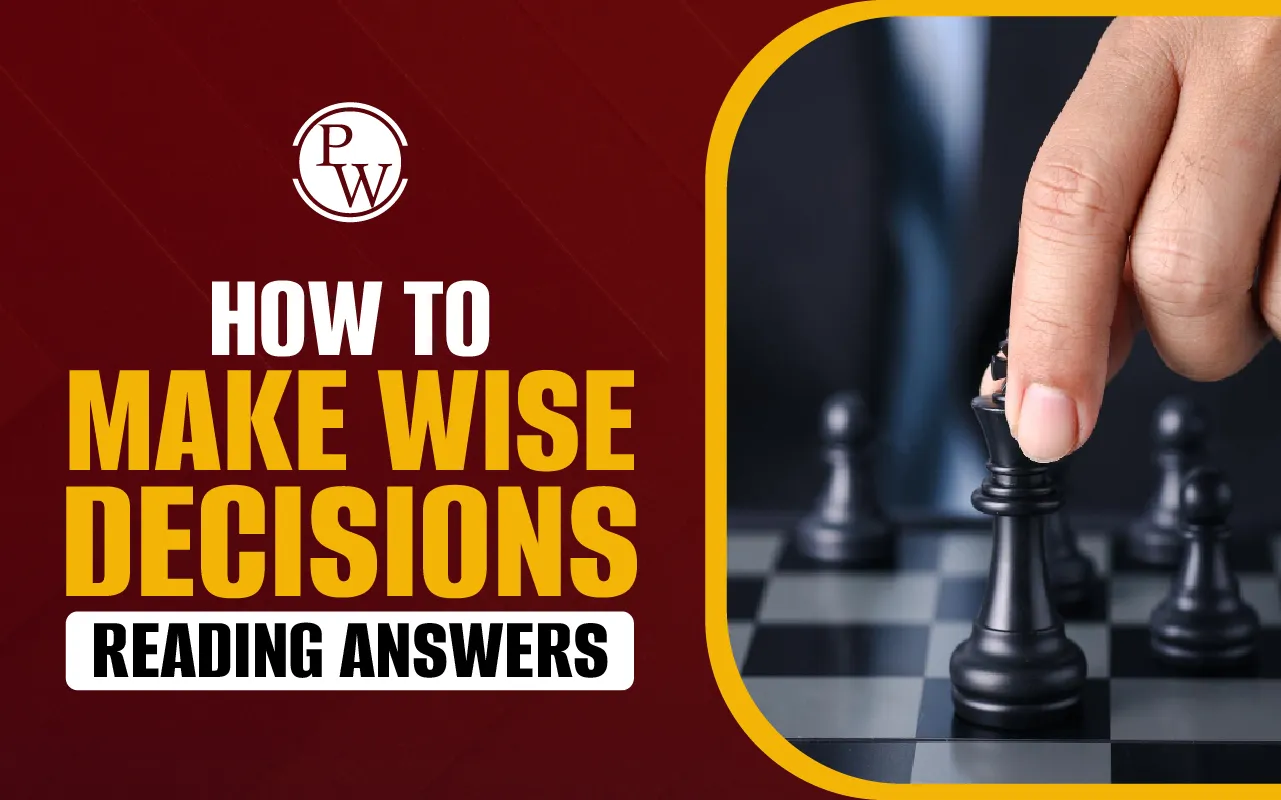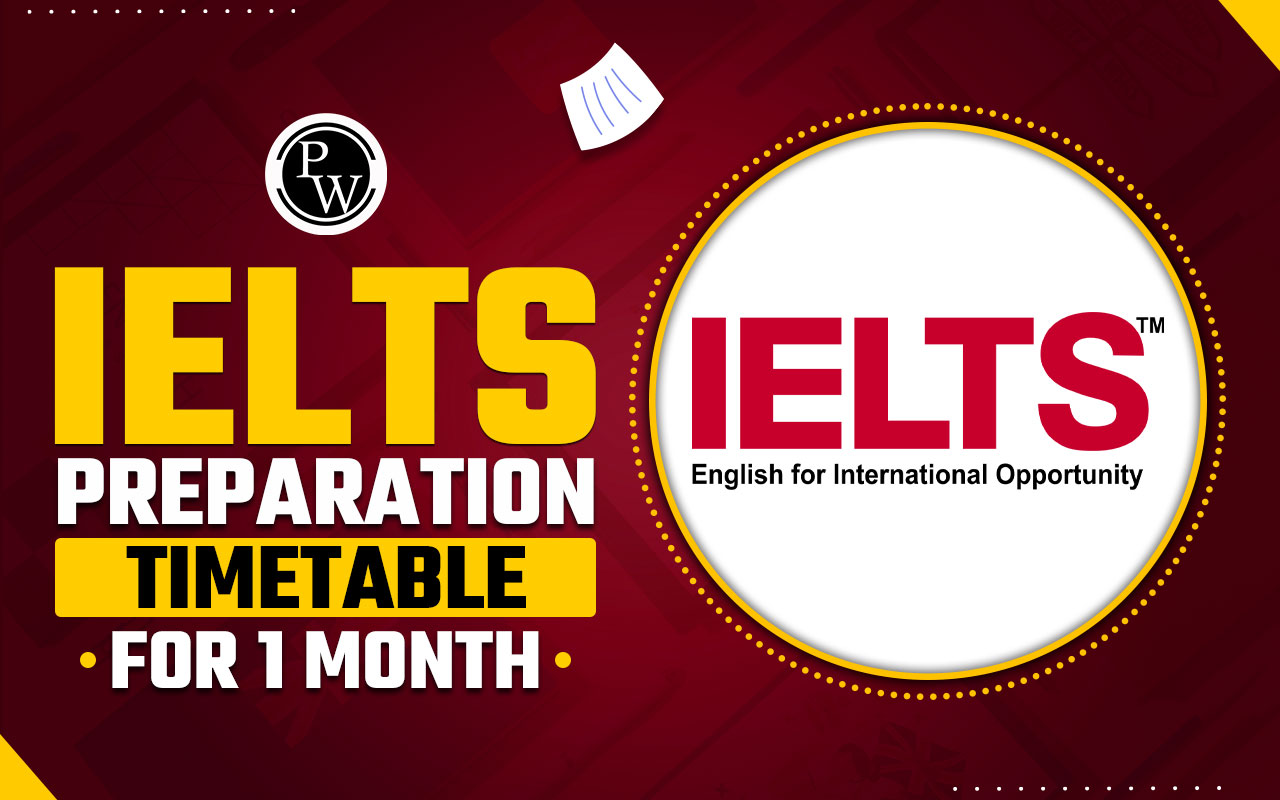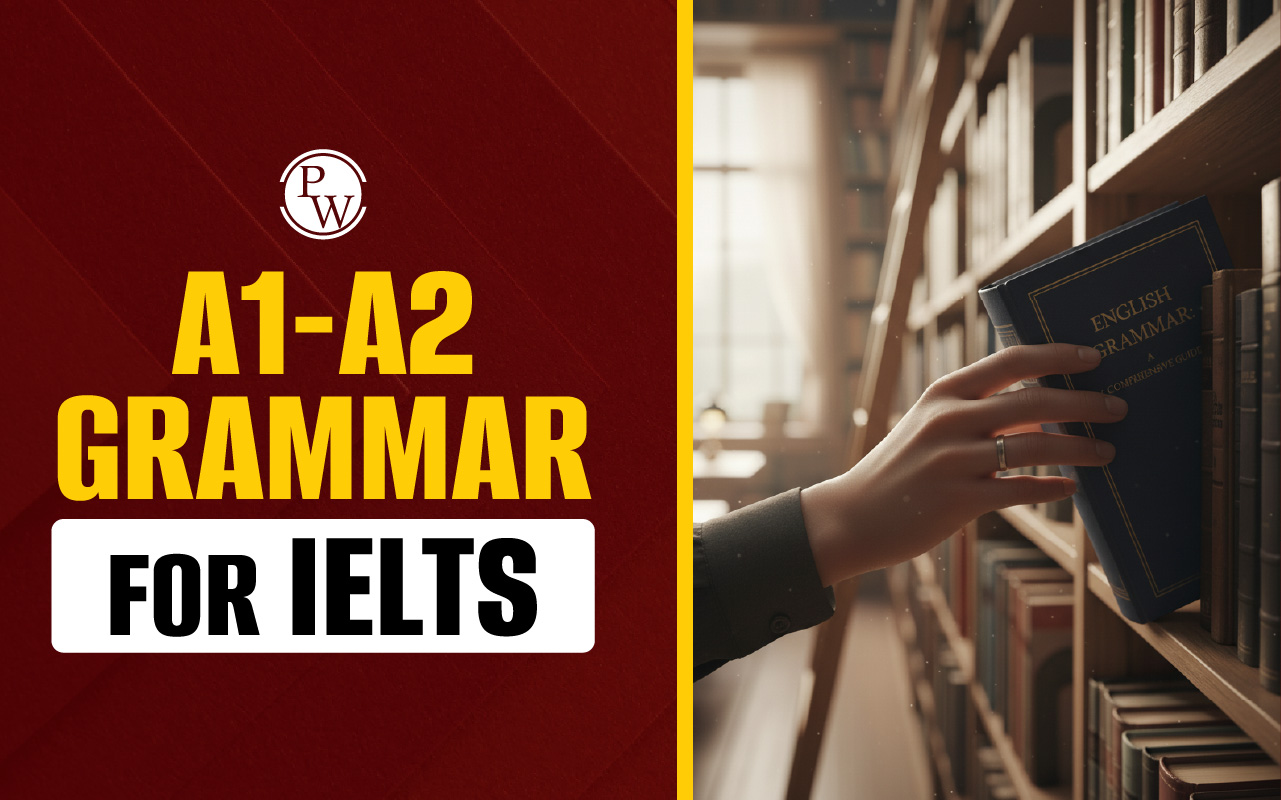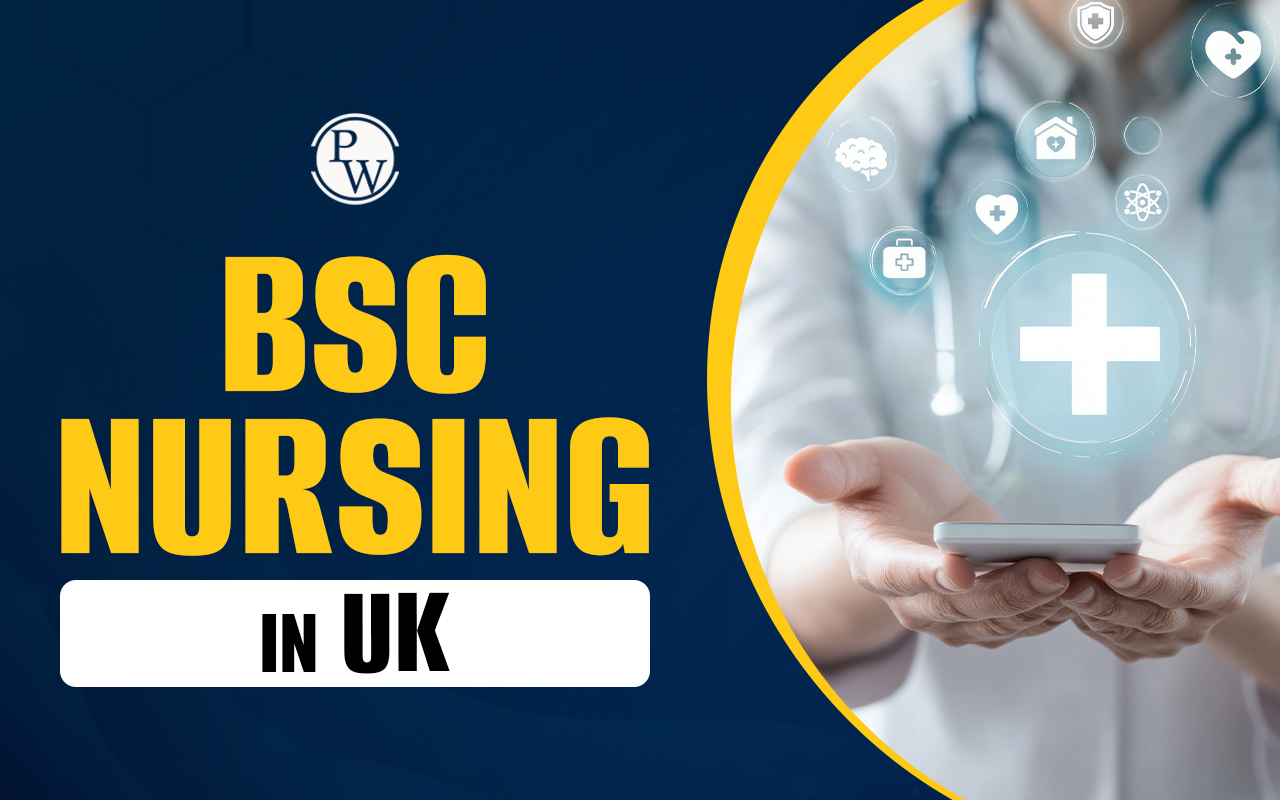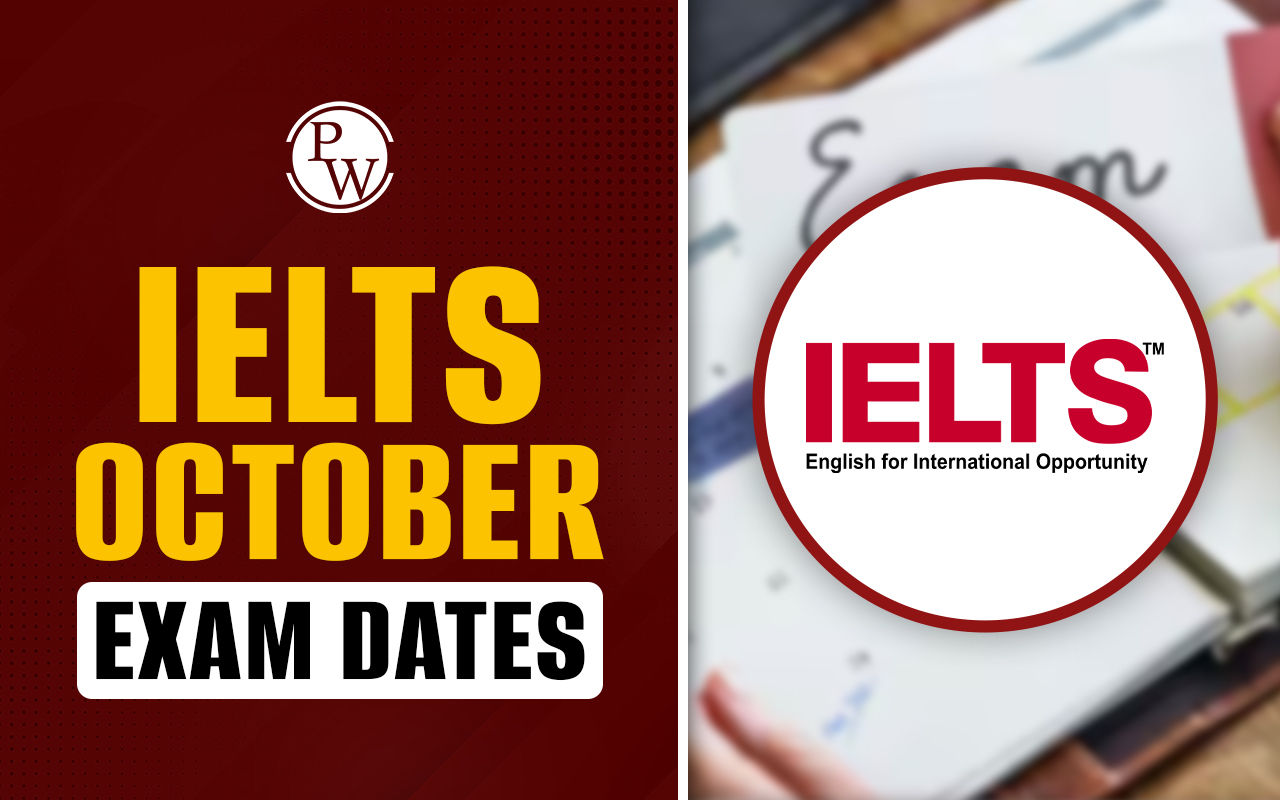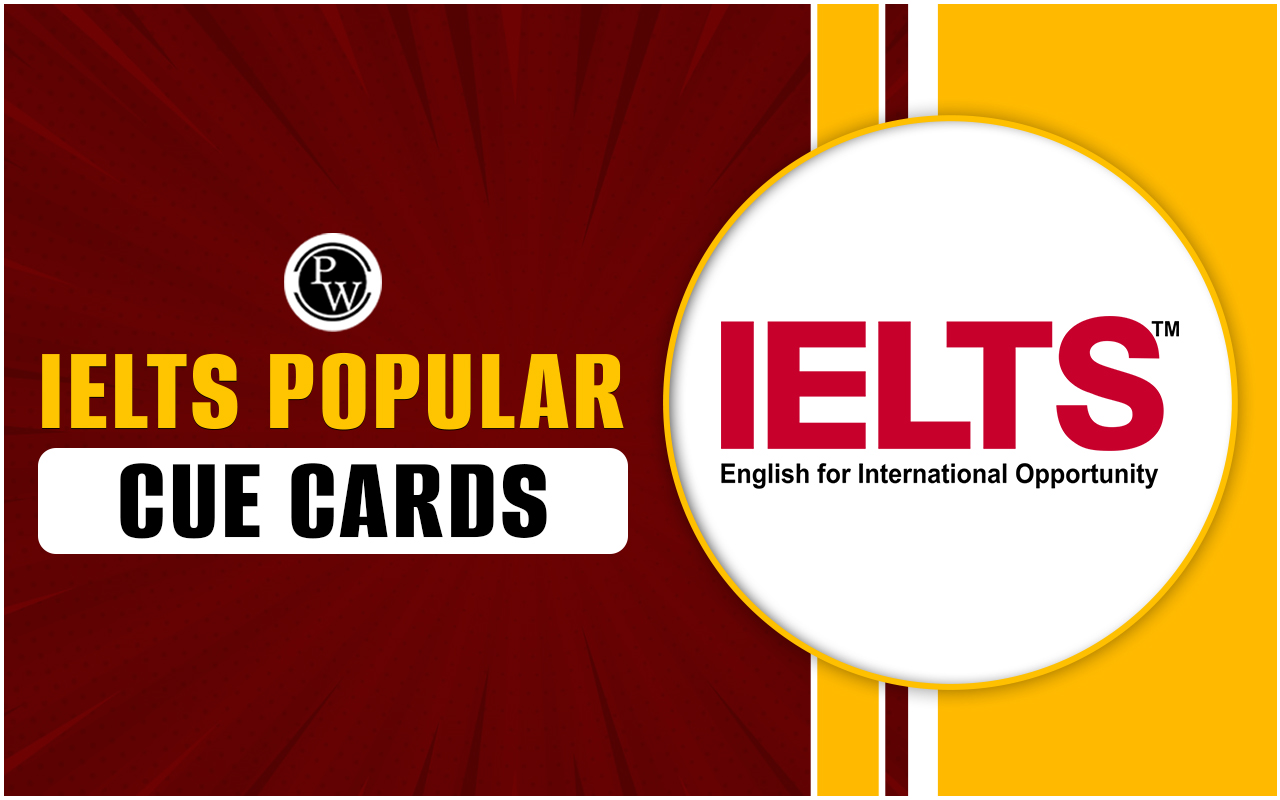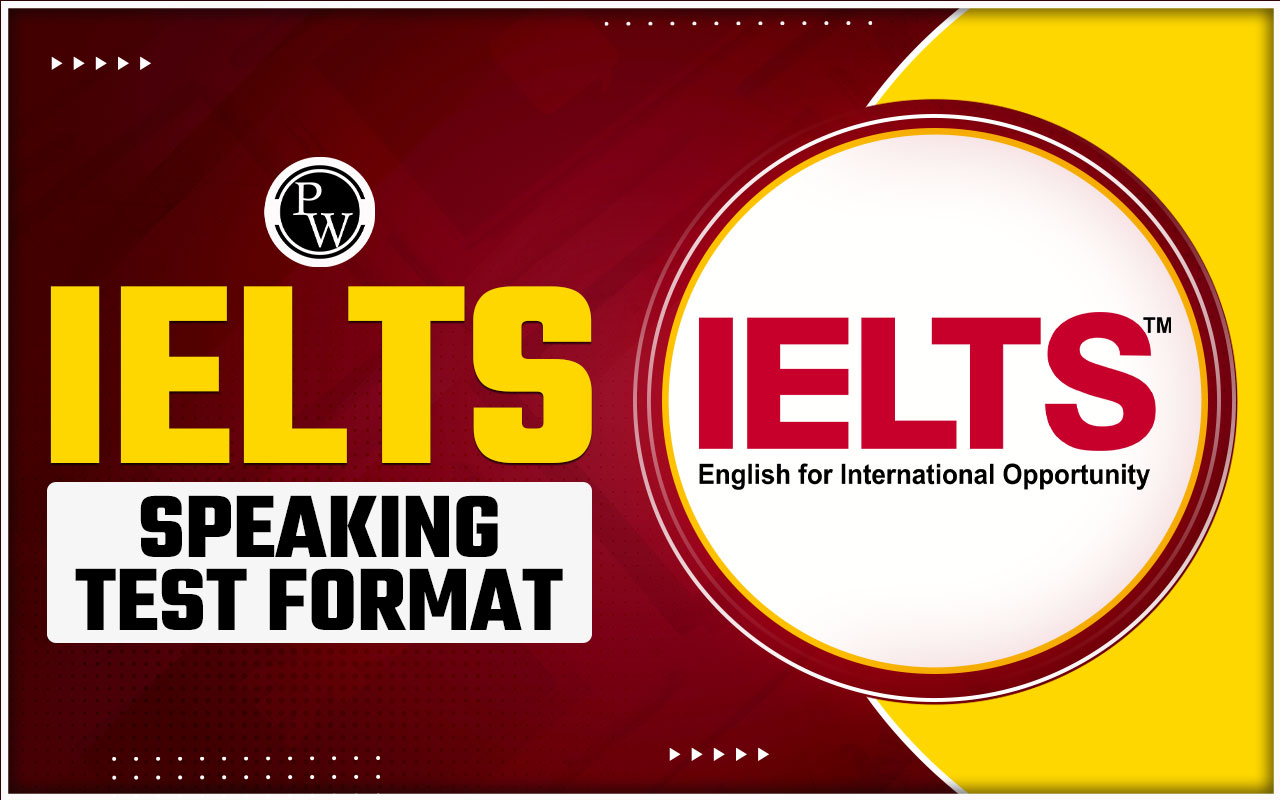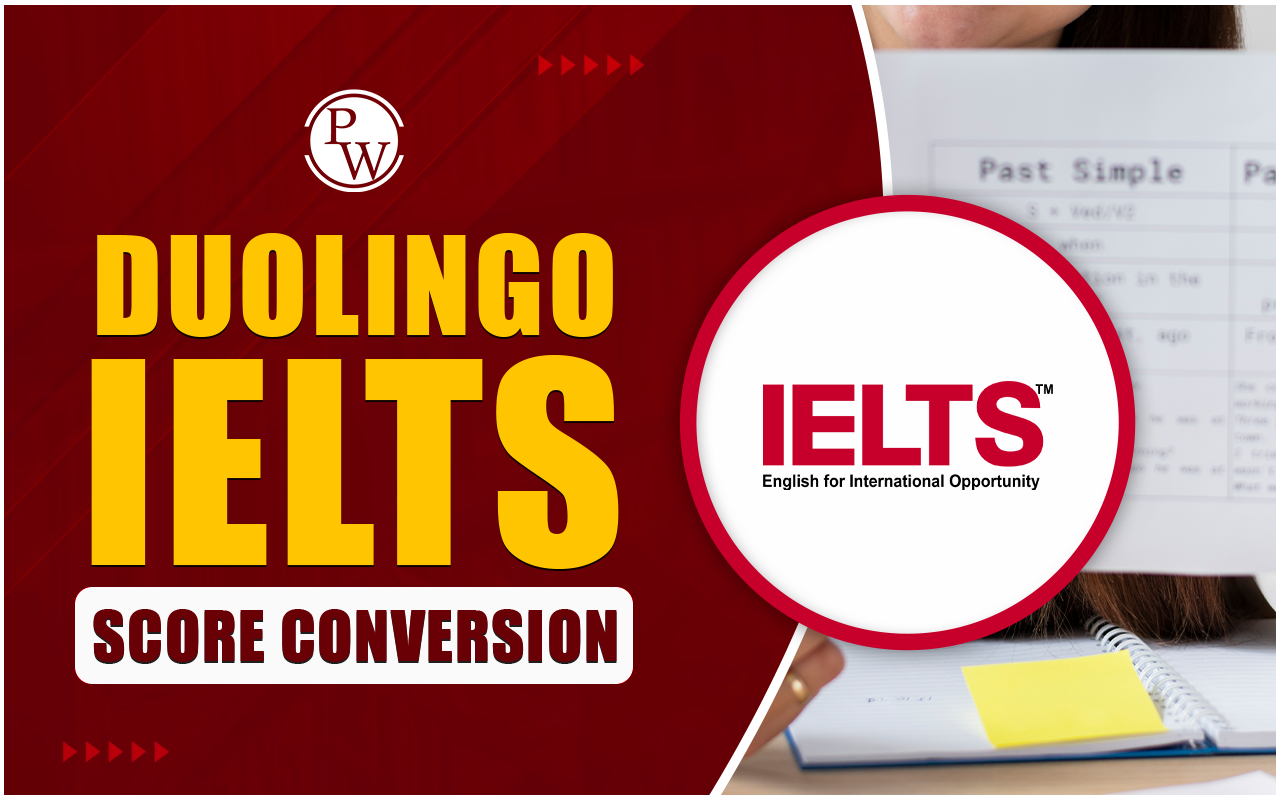
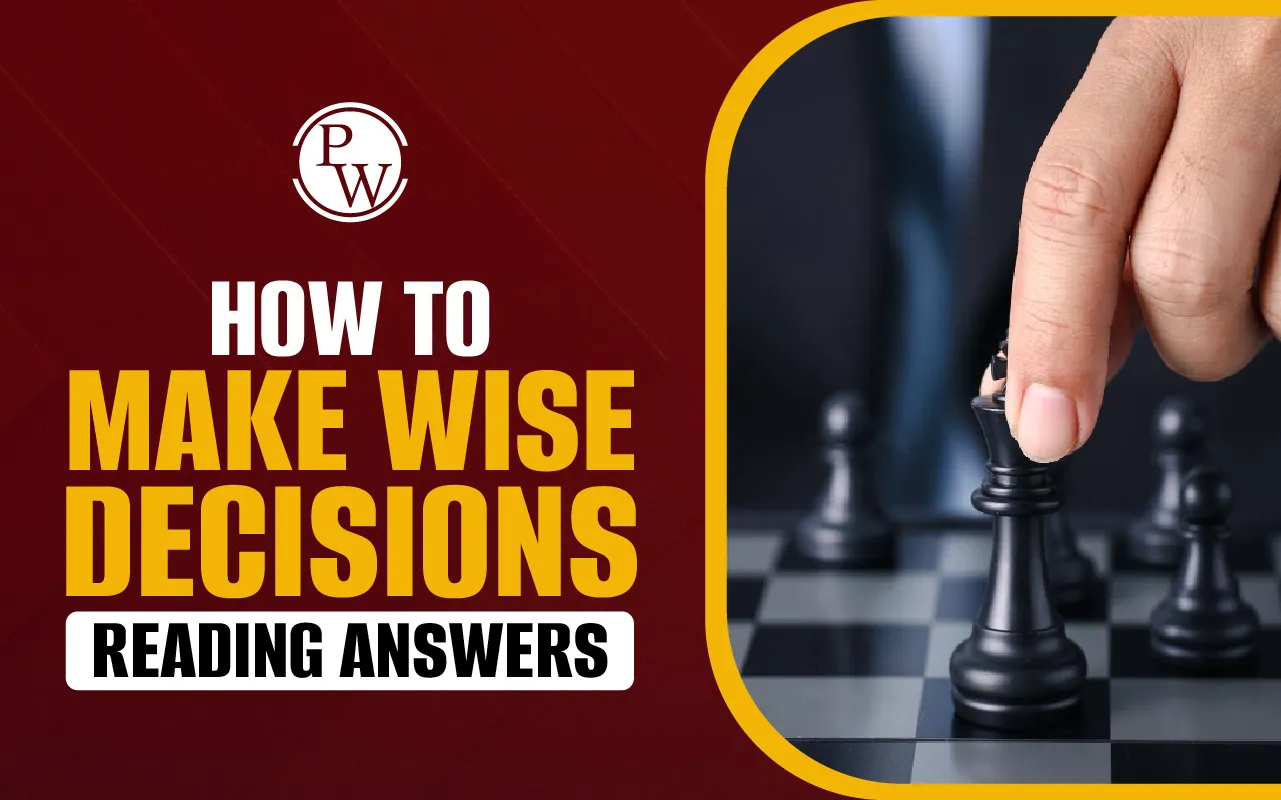
How to Make Wise Decisions Reading Answers: The IELTS exam reading section tests your ability to understand main ideas, locate specific details, and analyze complex language. Practicing How to Make Wise Decisions Reading Answers can help sharpen these skills by exploring the factors influencing wise decision-making and how situational context shapes reasoning. This passage includes a range of question types, such as multiple choice, sentence completion, and true/false/not given, allowing you to apply targeted strategies and improve your accuracy. Carefully reading and analyzing the passage will enhance your ability to handle the IELTS Reading module with confidence and aim for a higher IELTS band score.
How to Make Wise Decisions Reading Answers Passage
You should spend about 20 minutes on questions 1-14 based on the Reading Passage below.
How to Make Wise Decisions
A. Across cultures, wisdom has been considered one of the most revered human qualities. Although the truly wise may seem few and far between, empirical research examining wisdom suggests that it isn’t an exceptional trait possessed by a small handful of bearded philosophers after all – in fact, the latest studies suggest that most of us have the ability to make wise decisions, given the right context.
B. ‘It appears that experiential, situational, and cultural factors are even more powerful in shaping wisdom than previously imagined,’ says Associate Professor Igor Grossmann of the University of Waterloo in Ontario, Canada. ‘Recent empirical findings from cognitive, developmental, social, and personality psychology cumulatively suggest that people’s ability to reason wisely varies dramatically across experiential and situational contexts. Understanding the role of such contextual factors offers unique insights into understanding wisdom in daily life, as well as how it can be enhanced and taught.’
C. It seems that it’s not so much that some people simply possess wisdom and others lack it, but that our ability to reason wisely depends on a variety of external factors. ‘It is impossible to characterize thought processes attributed to wisdom without considering the role of contextual factors,’ explains Grossmann. ‘In other words, wisdom is not solely an “inner quality” but rather unfolds as a function of situations people happen to be in. Some situations are more likely to promote wisdom than others.’
D. Coming up with a definition of wisdom is challenging, but Grossmann and his colleagues have identified four key characteristics as part of a framework of wise reasoning. One is intellectual humility or recognition of the limits of our own knowledge, and another is the appreciation of perspectives wider than the issue at hand. Sensitivity to the possibility of change in social relations is also key, along with compromise or integration of different attitudes and beliefs.
E. Grossmann and his colleagues have also found that one of the most reliable ways to support wisdom in our own day-to-day decisions is to look at scenarios from a third-party perspective, as though giving advice to a friend. Research suggests that when adopting a first-person viewpoint we focus on ‘the focal features of the environment’ and when we adopt a third-person, ‘observer’ viewpoint we reason more broadly and focus more on interpersonal and moral ideals such as justice and impartiality. Looking at problems from this more expansive viewpoint appears to foster cognitive processes related to wise decisions.
F. What are we to do, then, when confronted with situations like a disagreement with a spouse or negotiating a contract at work, that require us to take a personal stake? Grossmann argues that even when we aren’t able to change the situation, we can still evaluate these experiences from different perspectives.
G. For example, in one experiment that took place during the peak of a recent economic recession, graduating college seniors were asked to reflect on their job prospects. The students were instructed to imagine their career either ‘as if you were a distant observer’ or ‘before your own eyes as if you were right there’. Participants in the group assigned to the ‘distant observer’ role displayed more wisdom-related reasoning (intellectual humility and recognition of change) than did participants in the control group.
H. In another study, couples in long-term romantic relationships were instructed to visualize an unresolved relationship conflict either through the eyes of an outsider or from their own perspective. Participants then discussed the incident with their partner for 10 minutes, after which they wrote down their thoughts about it. Couples in the ‘other’s eyes’ condition were significantly more likely to rely on wise reasoning – recognizing others’ perspectives and searching for a compromise – compared to couples in the egocentric condition.
I. ‘Ego-decentering promotes greater focus on others and enables a bigger picture, conceptual view of the experience, affording recognition of intellectual humility and change,’ says Grossmann.
J. We might associate wisdom with intelligence or particular personality traits, but research shows only a small positive relationship between wise thinking and crystallized intelligence and the personality traits of openness and agreeableness. ‘It is remarkable how much people can vary in their wisdom from one situation to the next, and how much stronger such contextual effects are for understanding the relationship between wise judgment and its social and affective outcomes as compared to the generalized “traits”,’ Grossmann explains. ‘That is, knowing how wisely a person behaves in a given situation is more informative for understanding their emotions or likelihood to forgive [or] retaliate as compared to knowing whether the person may be wise “in general”.’
| IELTS Exam Important Links | |
|---|---|
| IELTS Reading Band Score | IELTS Listening Band Score |
| IELTS Speaking Band Score | IELTS Writing Band Score |
How to Make Wise Decisions Reading Answers Sample Questions
Multiple Choice Questions (Q. 1–4)
-
According to Grossmann, what influences a person’s ability to make wise decisions the most?
A) Intelligence and personality traits
B) Cultural and situational factors
C) Formal education and training
D) Life experiences and age -
What is one of the four key characteristics of wise reasoning identified by Grossmann and his colleagues?
A) Quick decision-making
B) Strong emotional response
C) Intellectual humility
D) High intelligence -
How can people enhance their ability to make wise decisions in personal conflicts?
A) By focusing solely on their own feelings
B) By seeking advice from others
C) By adopting a third-party perspective
D) By reacting immediately without overthinking -
In the study involving job prospects during an economic recession, which group demonstrated more wisdom-related reasoning?
A) The group that viewed the situation as an outsider
B) The group that focused on their personal perspective
C) The group that avoided thinking about the problem
D) The group that received professional advice
Sentence Completion (Q. 5–9)
-
According to Grossmann, wisdom is influenced more by __________ than by innate personality traits.
-
One of the methods to improve decision-making skills is to view situations from __________.
-
In the study involving romantic couples, those who imagined the conflict from an outsider's perspective were more likely to display __________.
-
Looking at problems from a broader viewpoint encourages focus on __________ and moral values.
-
Research suggests that people's ability to reason wisely varies depending on __________ factors.
True/False/Not Given (Q. 11–14)
-
Grossmann believes that wisdom is primarily an inherited trait.
-
The study on job prospects showed that students who viewed their career situation from an outsider's perspective demonstrated greater intellectual humility.
-
People who are highly intelligent are always capable of making wise decisions.
-
According to research, adopting an outsider's perspective can reduce emotional involvement in decision-making.
How to Make Wise Decisions Reading Answers with Explanations
-
What influences a person’s ability to make wise decisions the most?
-
Answer: B) Cultural and situational factors
-
Location: Paragraph B
-
Reference: "Experiential, situational, and cultural factors are even more powerful in shaping wisdom than previously imagined."
-
Explanation: Grossmann highlights that external factors such as culture and situational context have a greater impact on wisdom than innate traits.
-
What is one of the four key characteristics of wise reasoning identified by Grossmann and his colleagues?
-
Answer: C) Intellectual humility
-
Location: Paragraph D
-
Reference: "One is intellectual humility or recognition of the limits of our own knowledge…"
-
Explanation: Grossmann identifies intellectual humility as a key component of wise reasoning, along with perspective-taking and compromise.
-
How can people enhance their ability to make wise decisions in personal conflicts?
-
Answer: C) By adopting a third-party perspective
-
Location: Paragraph E
-
Reference: "Research suggests that when adopting a first-person viewpoint…when we adopt a third-person…we reason more broadly and focus more on interpersonal and moral ideals."
-
Explanation: Taking a third-person view allows people to think more broadly and make more balanced decisions.
-
In the study involving job prospects during an economic recession, which group demonstrated more wisdom-related reasoning?
-
Answer: A) The group that viewed the situation as an outsider
-
Location: Paragraph G
-
Reference: "Participants in the group assigned to the ‘distant observer’ role displayed more wisdom-related reasoning… than did participants in the control group."
-
Explanation: Participants who viewed their career situation as an outsider showed greater intellectual humility and adaptability.
-
According to Grossmann, wisdom is influenced more by __________ than by innate personality traits.
-
Answer: situational and cultural factors
-
Location: Paragraph B
-
Reference: "Experiential, situational, and cultural factors are even more powerful in shaping wisdom than previously imagined."
-
Explanation: Grossmann emphasizes that external factors shape wisdom more than inherent traits.
-
One of the methods to improve decision-making skills is to view situations from __________.
-
Answer: a third-party perspective
-
Location: Paragraph E
-
Reference: "One of the most reliable ways to support wisdom…is to look at scenarios from a third-party perspective."
-
Explanation: Taking an outsider’s viewpoint helps foster wise reasoning.
-
In the study involving romantic couples, those who imagined the conflict from an outsider's perspective were more likely to display __________.
-
Answer: wise reasoning
-
Location: Paragraph H
-
Reference: "Couples in the ‘other’s eyes’ condition were significantly more likely to rely on wise reasoning…"
-
Explanation: Viewing the conflict from a third-party perspective led to better compromise and understanding.
-
Looking at problems from a broader viewpoint encourages focus on __________ and moral values.
-
Answer: justice
-
Location: Paragraph E
-
Reference: "…we reason more broadly and focus more on interpersonal and moral ideals such as justice and impartiality."
-
Explanation: A broader perspective fosters focus on moral values.
-
Research suggests that people's ability to reason wisely varies depending on __________ factors.
-
Answer: situational
-
Location: Paragraph C
-
Reference: "Wisdom is not solely an ‘inner quality’ but rather unfolds as a function of situations people happen to be in."
-
Explanation: Situational factors influence wise reasoning.
-
Grossmann believes that wisdom is primarily an inherited trait.
-
-
Answer: False
-
Location: Paragraph C
-
Reference: "Wisdom is not solely an ‘inner quality’ but rather unfolds as a function of situations people happen to be in."
-
Explanation: Wisdom is shaped more by situational factors than by inheritance.
-
-
The study on job prospects showed that students who viewed their career situation from an outsider's perspective demonstrated greater intellectual humility.
-
-
Answer: True
-
Location: Paragraph G
-
Reference: "Participants in the group assigned to the ‘distant observer’ role displayed more wisdom-related reasoning (intellectual humility…)"
-
Explanation: Viewing the situation from an outsider's view improved intellectual humility.
-
-
People who are highly intelligent are always capable of making wise decisions.
-
-
Answer: False
-
Location: Paragraph J
-
Reference: "Research shows only a small positive relationship between wise thinking and crystallized intelligence."
-
Explanation: Intelligence alone does not guarantee wise decision-making.
-
-
According to research, adopting an outsider's perspective can reduce emotional involvement in decision-making.
-
-
Answer: Not Given
-
Explanation: The passage mentions that adopting an outsider’s perspective promotes better reasoning, but it does not explicitly state that it reduces emotional involvement.
-
Also Read:
- Should You Use All Capital Letters in the IELTS Listening and Reading Tests
- IELTS Reading Mistakes
- How to Improve IELTS Reading Score
- How to Manage Time in IELTS Reading
Guidance of PW IELTS
Physics Wallah offers multiple online IELTS courses for all students. Follow the IELTS pages to better prepare for the exam.
| What is IELTS Exam? | Documents Required for IELTS Registration |
| IELTS exam eligibility requirements | IELTS Exam Fees |
| IELTS test results | IELTS Exam Pattern |
How to Make Wise Decisions Reading Answers FAQs
What are the key characteristics of wise reasoning identified by Grossmann?
How can adopting a third-party perspective improve decision-making?
Is wisdom more influenced by personality traits or situational factors?
Can wisdom be improved or taught?

